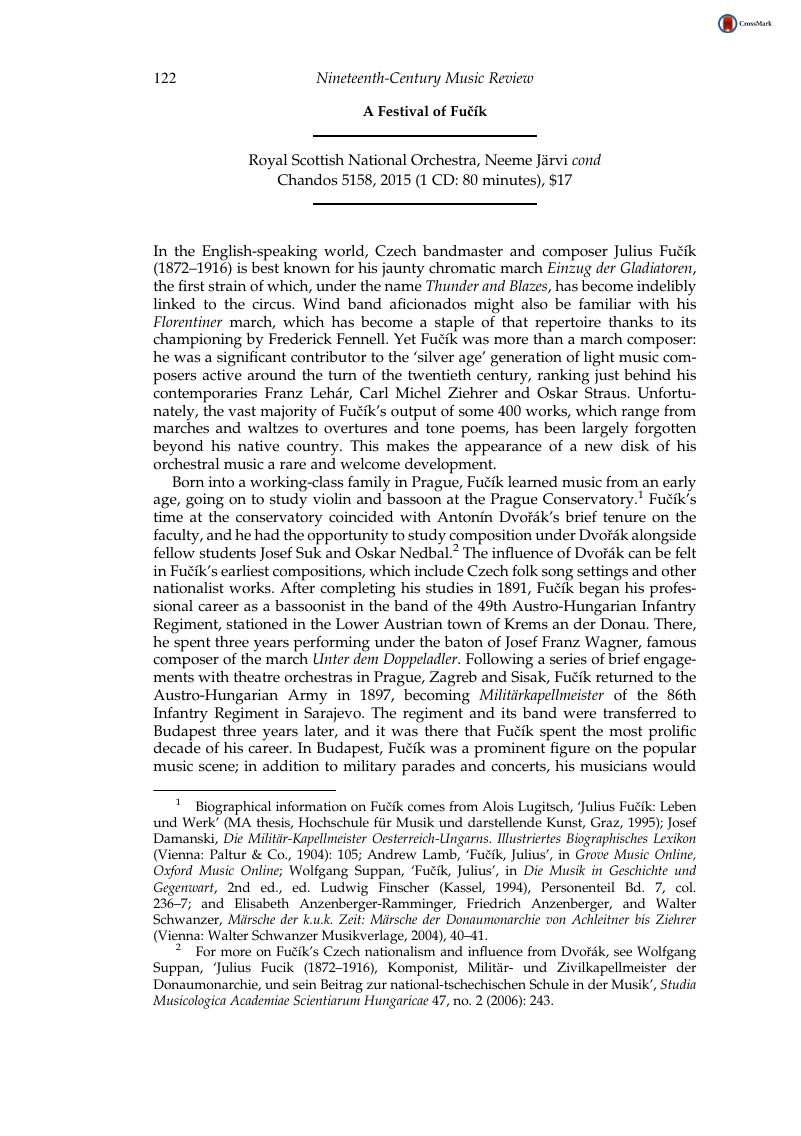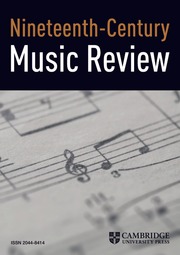No CrossRef data available.
Article contents
A Festival of Fučík - Royal Scottish National Orchestra, Neeme Järvi cond - Chandos 5158, 2015 (1 CD: 80 minutes), $17
Published online by Cambridge University Press: 04 May 2017
Abstract

- Type
- CD Reviews
- Information
- Copyright
- © Cambridge University Press 2017
References
1 Biographical information on Fučík comes from Alois Lugitsch, ‘Julius Fučík: Leben und Werk’ (MA thesis, Hochschule für Musik und darstellende Kunst, Graz, 1995); Damanski, Josef, Die Militär-Kapellmeister Oesterreich-Ungarns. Illustriertes Biographisches Lexikon (Vienna: Paltur & Co., 1904): 105 Google Scholar; Lamb, Andrew, ‘Fučík, Julius’, in Grove Music Online, Oxford Music Online Google Scholar; Suppan, Wolfgang, ‘Fučík, Julius’, in Die Musik in Geschichte und Gegenwart, 2nd ed., ed. Ludwig Finscher (Kassel, 1994)Google Scholar, Personenteil Bd. 7, col. 236–7; and Anzenberger-Ramminger, Elisabeth, Anzenberger, Friedrich, and Schwanzer, Walter, Märsche der k.u.k. Zeit: Märsche der Donaumonarchie von Achleitner bis Ziehrer (Vienna: Walter Schwanzer Musikverlage, 2004), 40–41 Google Scholar.
2 For more on Fučík’s Czech nationalism and influence from Dvořák, see Suppan, Wolfgang, ‘Julius Fucik (1872–1916), Komponist, Militär- und Zivilkapellmeister der Donaumonarchie, und sein Beitrag zur national-tschechischen Schule in der Musik’, Studia Musicologica Academiae Scientiarum Hungaricae 47, no. 2 (2006): 243 Google Scholar.
3 Nationalism was such a potent force in the Austro-Hungarian Empire during the late nineteenth century that army regiments were routinely stationed far from the homelands of the recruits for fear that they would hesitate to fire on members of their own ethnic groups should the need arise.
4 Damanski, Die Militär-Kapellmeister Oesterreich-Ungarns. 1910 census figures are cited in Sked, Alan, The Decline and Fall of the Habsburg Empire, 1815–1918 (New York: Longman, 2001): 335 Google Scholar.
5 This is the crux of the standing order issued by Franz Joseph on 16 September 1903 while on maneuvers near the town of Chłopy, in Galicia. See Steed, Henry Wickham, The Hapsburg Monarchy, 4th ed. (London: Constable and Co., 1919), 66–67 Google Scholar; see also Jason S. Heilman, ‘O du mein Österreich: Patriotic Music and Multinational Identity in the Austro-Hungarian Empire’ (PhD diss., Duke University, 2009), 78–88.



